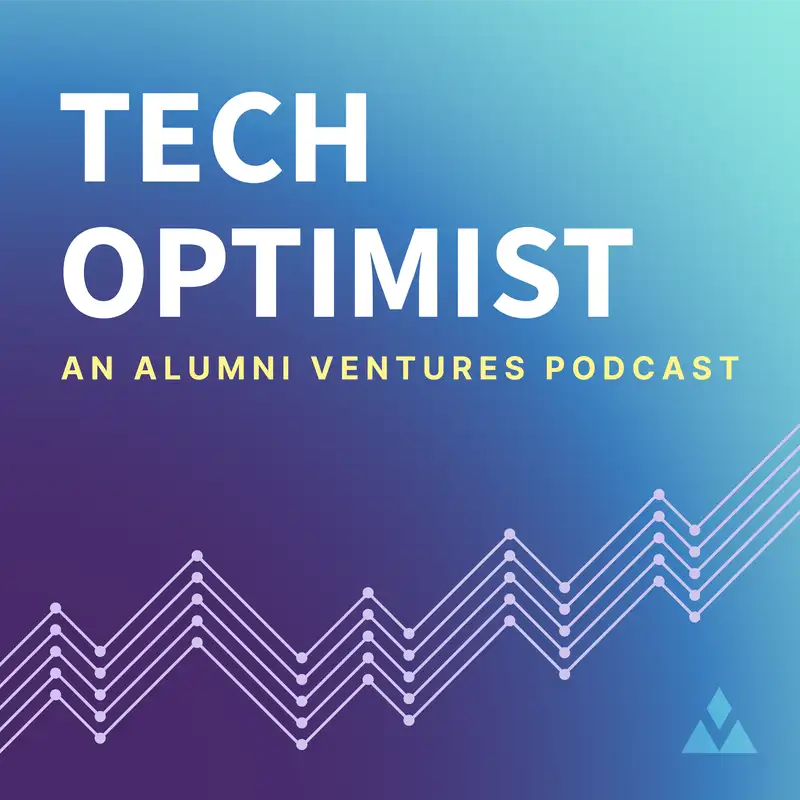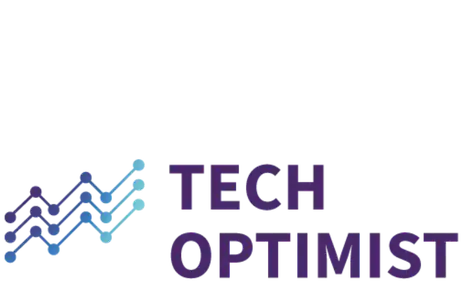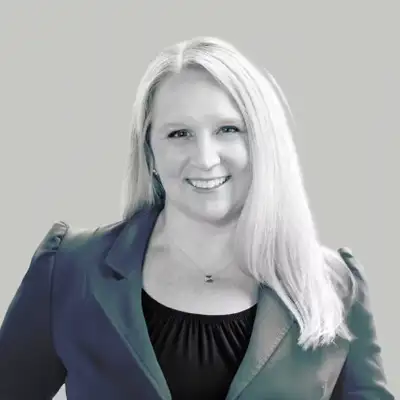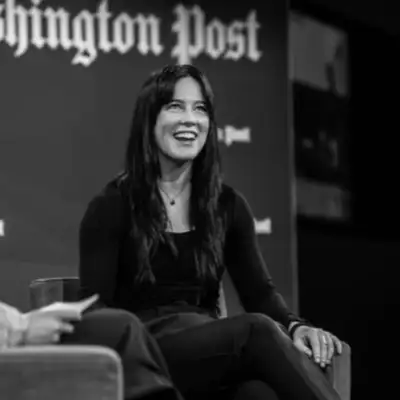#55 - Blue Flame Thinkers: Kyla Scanlon
Sam:
Welcome to the Alumni Ventures podcast, the Tech Optimist. This is our Blue Flame Thinkers show. This is a new one for you. We hope you enjoy. Now I know what you're thinking. This doesn't look like a typical Tech Optimist episode, and that's because you're right. Welcome to the first installment of the Blue Flame Thinkers, part of the Tech Optimist podcast. Today as always, our guide is going to be Mike Collins, founder and CEO at Alumni Ventures, and our first guest on the show, Kyla Scanlon, founder, author, educator, content creator, and she's, again, the founder of a cool company, Bread. My name is Sam and I'm the editor and guide for this show. Mostly for this episode today, I'm going to take a step back and we're all just going to listen and really absorb the conversation that Mike and Kyla have today.
So Kyla has done so much at her age. I'm just going to read her bio from her LinkedIn. "I'm the founder of a financial education company called Bread and a creator. I write a newsletter, make YouTube videos, and daily short form videos. My main goal is to conduct human-centric economic analysis to help connect the dots between what is happening and why it's happening." I think that's so important because in this day and age, there is so much content and so much stuff everywhere, all the time, that we need a translator, especially people like me. So Kyla has an insane social following. On Instagram she has 255,000 followers, on TikTok she has 183.8K followers, and on YouTube she has almost 51,000 subscribers with 400 videos. So without any further ado, let's dive into this conversation between Mike and Kyla.
As a reminder, the Tech Optimist podcast is for the informational purposes only. It is not personalized advice, and it is not an offer to buy or sell securities. For additional important details, please see the text description accompanying this episode.
Mike Collins:
Hello, welcome to this week's episode of Alumni Ventures and our Tech Optimist podcast. This is our Blue Flame Thinker edition, and I've got Kyla Scanlon as our guest today. If you don't know Kyla, get ready. She's young, entrepreneurial, super sharp, and you need to follow her on Instagram like right now. Kyla is the author of a book already, In This Economy? She has something like a quarter of a million followers on Instagram, and I think her superpower is her ability to take two hours of mind-numbing financial blathering from a financial channel on TV and kind of give you two crisp minutes of really clear thought and analysis. She's built her own platform translating confusing things into language that everyday folks can understand. It's impressive. Congratulations. I'm excited to talk with her today. So Kyla, welcome to the show.
Kyla Scanlon:
Oh, thanks so much for having me on.
Mike Collins:
So my first question, this is one of my favorite questions, which is what do you think the world is really missing? What does it have wrong? What do you think that the rest of the world doesn't get?
Kyla Scanlon:
Just in general or in terms of the economy? I guess-
Mike Collins:
Just pick one thing that you think is the biggest miss.
Kyla Scanlon:
Yeah, I mean, I think the biggest thing is apprenticeships. I've been thinking a lot about that and what does it take to build the next Renaissance. I think that we have a lot of amazing art and a lot of amazing videos. We have so much amazing stuff, but it's really difficult to sift through all the information and there's a point of saturation that we're at, and it seems like the really, really good stuff is harder to find. And so I think going back to the point of apprenticeships and the Renaissance, a big part of the Renaissance was that these artists and these painters and these thinkers had sponsorship to be able to do the work that they needed to do, and they were apprenticed to the top artists before them. There was a lot of mentorship. And so I think I would wish that the world would invest a little bit more into that. What does it look like to train up the next generation of thinkers and how do you connect them with other leaders? And then what does it take to really invest in the arts in a meaningful way?
Mike Collins:
Yeah, I mean, I think there's two threads of that. The world needs more curation, which is it's so noisy, how do I find the good stuff? So I do agree with you. I think we're going to swing back a little bit to everybody's a creator, everybody's a brand, but it's just too much. How do I get to the good stuff? Yeah, mentoring and apprenticing and that in this world of technology empowering the individual and individual contributors, I think it's super interesting to think about where are there opportunities to pay it forward and mentor and apprentice and learn. [inaudible 00:06:02].
Kyla Scanlon:
There is this article from Mother Jones and however you feel about them as an outlet, whatever. But the article was really good because it was talking about electricians and how we don't have enough electricians, especially for the transition to green energy. We don't have enough electricians to be focused on building data centers and maintaining data centers for AI. And so there's kind of this interesting base layer of it too, where we're talking about content, we're talking about curation, but the things that are required to curate content, which would be electricity, that's not even established from an apprenticeship level at this point. And so I think just across the board, there's a real gap between generations for whatever reason, and I am not sure how to address that, but it's something I've noticed and there's kind of a leadership crisis where there's questions of who's going to take over across all these small businesses and big businesses too. And apprenticeships could be one way to address that. But a lot of threads that are kind of [inaudible 00:07:10] and dull, but sort of tied together.
Mike Collins:
And Kyla, the first thing is identifying the problem. And I think sometimes as a society, we always immediately jump to solutions and kind of short easy answers, but thinking deep about these problems, how do you develop the next generation of electricians? How do you develop the next generation of teachers, leaders, etc. Really good point. So tell me about a current project. What are you working on right now?
Kyla Scanlon:
Right now, so my book, In This Economy?, came out four months ago. And so I'm just sort of wrapping up the book tour and I'm kind of in the wasteland of between projects, but I'm really just focusing on my own writing again for my newsletter. So I wrote a piece on dating apps, I wrote a piece on home insurance, and the goal of my current work is to tie together disconnected thoughts. So with the dating apps, I talked about the demographic crisis. I'm going to write a piece on apprenticeships and tie that into AI. So that's the goal right now is just to get back to writing.
Mike Collins:
No, the beauty of writing is it's just such a great discipline to improve your thinking. And let's talk a little bit more about the demographic crisis. What are the three or four big threads there that you're thinking about?
Kyla Scanlon:
Well, I mean, it's really two main ones where students of distribution, where we have an aging population and we're not having enough babies and not having enough immigration to take care of the aging population. And so with the aging population, the over 65 age group is growing. They're growing tremendously fast, and younger people aren't as an age group. And the issue with that is that now the aging population is going to put pressure on social security, on Medicare, Medicaid, and also elder care is extraordinarily expensive. It's $5,000 a month on average.
And so you have, going through the generations, you have the Gen Xers and the Millennials, who are the sandwich generation. They're dealing with aging parents and then they're trying to have kids, maybe send those kids off to college. So they're dealing with the extreme cost of elder care. They're also dealing with the cost of college. And if they have young kids, they're dealing with the cost of childcare, which has risen 32% since 2019. And the reason that people aren't really having babies anymore is a variety of reasons. But one is that it is quite expensive and the fertility rate is far below the replacement rate. And we also have issues with immigration policy. We haven't really invested in that. And so that's the root of demographic crisis is not enough babies and aging population.
Mike Collins:
And again, as a venture capitalist, everything's a nail that I try to hammer. So we are investing in companies that are dealing with, we have just kind of nicknames for it, which is there's definitely the aging population. And then there's kind of the loneliness epidemic, low household formation. There's kind of a crisis on both ends of this adult spectrum here that we need new solutions. And there's a role, I think, for all of the above, government, root cause work to be done. A lot of this, in my opinion, is kind of unintended consequences of technology. I mean, you talked about dating apps, those things do certain things and there're unintended consequences of those things. But I also think there's a role for entrepreneurs and innovators and startups to solve problems. And these are real problems that our society faces.
Sam:
Okay, don't go anywhere. We have a quick ad and then we'll be right back.
Speaker 4:
Hey, everyone, just taking a quick break so I can tell you about the Deep Tech Fund from Alumni Ventures. AV is one of the only VC firms focused on making venture capital accessible to individual investors like you. In fact, AV is one of the most active and best performing VCs in the US, and we co-invest alongside renowned lead investors. With our Deep Tech Fund, you'll have the opportunity to invest in innovative solutions to major technical and scientific challenges, which can have a hugely positive effect on society, companies that have the potential to redefine industries and create a more sustainable future and deliver significant financial returns. So if you're interested, visit us at av.vc/funds/deeptech. Now back to the show.
Kyla Scanlon:
Yeah, I mean, I think sometimes it's almost over optimization by some startups where they techify everything and that creates even more issues. It really, I think there needs to be a return to organic connection sometimes, but that's really tough to manufacture. But yeah, I know that there's companies focused on that, but I'm glad to hear that they're investable too.
Mike Collins:
Yeah, no, I mean, and one of the things as a society, we've lost some of those face-to-face opportunities for people just to mingle. And examples of that is, in New York for example now, there are running clubs that literally have thousands of single people just kind of go out for a run and people are just bumping into each other and meeting people and just getting out. And they're doing that with now book clubs and bar bookstore hybrid concepts because there is just this lack of third places now for people to meet other people with common interests.
So yeah, again, I am a tech optimist. I'm a tech guy. I've been in it my whole life. So I definitely view things through a lens that some technology goes forward, it's a great solution, but then it creates these problems. The automobile was great, but all kinds of horrible things have happened because of the automobile, but we're not going to undo it. The only solution is really to go forward and now solve those problems and keep innovating. But that's my perspective. We never go backwards. So you've had really an interesting career professional success. Just sharing with our audience, what are two or three things that you got right so far?
Kyla Scanlon:
I mean, I think a lot of it is, the way that I talk about it, hard work meets opportunity and that's luck in a big way. And I think that's one thing I got right was worked pretty hard for a long time and was making videos during the pandemic when everybody was stuck inside. And that really helped. You had a captive audience. And so I think that's a big part of it. And then I just think consistency too. I try to be as consistent as I can for the audience with videos and posting and writing and making sure that I'm addressing their questions. So I would say those are two things I've gotten right. And then of course there's the stuff you can't even measure, which is how helpful other people have been. The number of people that take chances on me, believed in me, helped me out, it's like unreal.
Mike Collins:
Great. How about trends, segments? Again, a lot of our audience are interested in technology and trends in the future. If you were a VC for a day, where would you be looking?
Kyla Scanlon:
Yeah, I mean, I think for me, I am very interested in homes and housing and housing supply, specifically home insurance. So I'm very fascinated by how we can fix the insurance crisis that we have. But health insurance, home insurance, auto insurance, it's a massive issue across the board. That requires quite a bit of interface with the government, of course, and private insurers. How do you actually properly price risk? And so that's something I would probably want to spend time on as a VC. I don't know what the multiple would be, but I think it could be a really interesting place. And then I think also, yeah, some sort of human connection thing. I know that a lot of, there's whole entire VC firms that are focused on that. I think Bri Kimmel has a firm dedicated to it. But yeah, I think those would be the two things would be like, okay, so how do we properly price risk across everything? And then how do we actually hang out with each other?
Mike Collins:
Yeah, cool. All right, so playing a little game, long or short. So the basic idea is I'm just going to give you a name of a company or a word and tell me are you long or short that idea and why. And then you can play it back to me if you want. But yeah, I mean, residential home prices, Kyla. What do you think? Long or short?
Kyla Scanlon:
Long meaning that they're going to continue to go up probably? Is that what that [inaudible 00:17:21]?
Mike Collins:
Bullish or bearish. Are you like price is going up, price is going down, price is going sideways over the next couple of years?
Kyla Scanlon:
See this is why I'm a bad investor. Because I'm like, "Well, it could mean this," but I think I'm probably long. I think that it's going to take a really long time to address the housing supply problem. And because of that supply and demand mismatch, it's very easy to have that upward pressure on prices. We have seen home prices basically flatline in a lot of areas, but not in a way that we're going down. And so I think that I would be almost neutral to bullish on home prices until we can address the housing supply issue at scale. And I don't know how long that will take.
Mike Collins:
I'm right with you on that. I think it's a supply problem and I think that's a hard problem and there's a lot of incentives that get in the way of it. And until that gets unleashed a little bit and maybe it's Boomers are getting older and dying off and maybe that creates some supply issues, but it's hard to be short housing prices right now, I think.
Kyla Scanlon:
Yeah. And then-
Mike Collins:
What do you think about... Yeah, go ahead. Sorry.
Kyla Scanlon:
Well, they tend to go up. That's kind of the issue with the housing prices. Even in the 1970s, 1980s, we did not have the sort of movement that we've had now where it's going up by $55,000 a year, the median home price. But home prices are usually where people park their money. The bottom 50%, all their wealth is in their house. And so I think for that reason, a loan, it's a speculative asset that people rely on and unfortunately that probably means that there will be incentives to make home prices go up, right?
Mike Collins:
Yeah, no, I think it's a place where the rich park wealth, it's a place where a lot of regular people have, as you point out, huge amount of their assets. It tends to be psychologically, I think, very sticky too. People don't like to lose... They won't move, they won't take their promotion at work because they don't want to take a loss in the house kind of thing. So it may not grow, to your point, but it's hard to see where it's going to really go down, I think.
Kyla Scanlon:
I'd agree.
Mike Collins:
All right. And are you long or short the idea of college?
Kyla Scanlon:
I have a tough time with this one because I loved college. I think it's important for people if they have the opportunity to go and have four years where you can make safe mistakes. So for me, I went there on a full ride, it was awesome, and that really was mentally good. But I think for a lot of people, the ROI on college has become quite low. Getting an entry level job with some degrees versus the amount of debt that you're taking on, the math's not adding up right now. And so I think for colleges there's a lot of bureaucratic bloat, a lot of people, I've written about that, where there's just a lot of administrators and they've kind of lost maybe the ethos of education in some capacities. It has become basically a football team with some classes attached to it. So I am long college because I think education is one of the most important things that we can do. But I worry about the current structure of the university system.
Mike Collins:
Yeah, I think I'm long short-term and short long-term.
Kyla Scanlon:
Yeah, why is that?
Mike Collins:
Meaning my niece just gave birth and she was asking about a 529 account, and I've always been a big believer and I funded my own kids' college education using them. But I said no. First of all, I think you have to get your own financial house in order first before you start saving for a kid 17 years from now. And I just think the existing system is so ripe to be disrupted and it has gotten so expensive. And I think there's problems at the high end, the Harvard Ivy League level, I think there's problems at basically all terms of the product stack. And I think in 15, 20 years it's going to be a very, very different world.
So I am just medium and long-term pretty bearish that that system has got to change pretty fundamentally. And again, like you, Kyla, I'm torn too because it was very important to me the education I got, the network I got, the credentialing I got, all very, very important. But I think it's kind of where we're heading is unsustainable. I think there's some technologies coming that are going to fundamentally change. I think the cost structure is way out of whack.
And I think it's a little scary and a little unfortunate because it's such an important national asset as well for our country. I mean, we do education, especially when you talk about colleges, we do that really, really well. People come from all over the world to go to our universities. And so I hope they get it fixed. But I am definitely concerned. And you pointed out with your comments earlier about the need for different ways, people who want to become electricians and where is our apprenticeship model and people who want to pursue the creative arts, what are the opportunities for those people to get in and be mentored and to develop a career? So I definitely think there's some opportunity there.
Kyla Scanlon:
Yeah, I would agree. There was a good article, I don't know if you saw it, from The Wall Street Journal a few months ago, calling Gen Z the tool belt generation, because some of the younger ones are foregoing college and saying, "Well, I'll just figure out the trades instead." And I could see that becoming more popular because yeah, it's just like the fact that people know that they're going and getting a degree that doesn't guarantee a job is tough. And there probably should be some sort of job guarantee model from the universities if you're going to take that much money from an 18-year-old and their parents. But yeah, it's unsustainable, I agree with you.
Mike Collins:
And I think it's also incumbent on businesses to be open-minded to hiring people without a degree. Some firms only recruit from five schools that have very prestigious names to them. And I think that's ridiculous. And so I think it's also incumbent on leaders and business people to encourage this kind of stuff.
Kyla Scanlon:
The reason I got my first job in the finance world when I graduated was because of blind resume. That firm only recruited from top five and I got in. And there's a lot of people I think that are like me that are willing to work hard and be there for the firm, but the end value matters more, I suppose. And so I agree with you, it'd be awesome if more firms opened up their lines.
Sam:
All right, we're going to take two seconds for a sponsor highlight and then we'll be right back into the show. Don't go anywhere.
Speaker 5:
Do you have a venture capital portfolio of cutting edge startups? Without one, you could be missing out on enormous value creation and a more diversified personal portfolio. Alumni Ventures, ranked a top 20 VC firm by CB Insights, is the leading VC firm for individual investors. Believe in investing in innovation? Visit av.vc/foundation to get started.
Kyla Scanlon:
You were talking a lot about third places and the loneliness crisis, and I guess I am curious what your long and short of that would be, the loneliness crisis itself. Do you think it's going to continue?
Mike Collins:
I'm optimistic about the future, meaning I have access to a lot of really smart, young, talented entrepreneurs who have identified this as a problem and are really interested in innovative ways to solve it. So I think some of the things that have taken place kind of in a societal basis with declining attendance of church and geographic flexibility, that people are just moving around and not establishing roots, clearly technology of being able to work remote, stay in touch with friends who are on the other side of the country. It's easier to keep an old friend who's on the other coast than to go out and try and meet a new person.
So I think people are identifying that and trying to create fun, interesting ways for people to connect with each other. And I think there'll be a lot of experiments and a lot of failures. And I think in the short term, there's unfortunately some kind of reactive things with mental health solutions. And the issue of, if you look at some of the top business schools now and something like a huge percentage of the women going to these schools are kind of freezing their eggs kind of thing because they want to prioritize their career and start families later and they want to have babies with the young good eggs, not the old eggs. And those are part of things going on.
But I also think there's more problem than solutions right now. And we are behind in addressing how people make connections, develop friendships, household formation, dating. No one likes the dating apps from what I can tell. Again, I think other people have written about that there's a huge gender difference, that a certain small group of men get 90% of the interest and that's not good for them and if you're not in that 10%, it's not good for you. So I think that that's a problem. So I think this is an area where I think there are more problems than answers, but I am optimistic that people have identified it and are talking about it. And if you go to incubators and Y Combinators' demo days, those kinds of things, there are people that are articulating potential approaches and solutions where we have to marry kind of the high tech with the high touch. And so I think we're swinging back toward the high touch end of human connection here.
Kyla Scanlon:
I hope so.
Mike Collins:
I don't know, do you have any thoughts on that?
Kyla Scanlon:
Yeah, I've written a lot about it and it's something I personally have experienced during the pandemic and I graduated into the pandemic and so all of a sudden you have no idea how to make friends as an adult. And I think one thing I worry about is the dopamine that comes from engaging with a smartphone versus engaging with a person. It's much easier to go to a crowd of faceless people and seek solace there than to seek solace from friends. But I'm optimistic too. I think that at the root, humans love each other. Not to get woo-woo about it, but I think there is that desire for connection and we will find our way back to it eventually. But there's just a lot of forces working against it. I think the dating apps have, not to their own fault, they were trying to solve a problem, but it made things worse.
Mike Collins:
Made it worse.
Kyla Scanlon:
Yeah. I don't think that was the intention by any mean.
Mike Collins:
Yeah, no, and I'll just speak from this standpoint, which is I am also seeing kind of a pendulum back with young people wanting to go into work. So again, we do a lot of really early stage investing and there was two years there where every startup was remote, they had no choice. And they're finding that they want to get together as a team, that they're more effective and more productive as a startup when they're physically together. And I think there's going to be a generation of startups who don't make it, and they're going to look back and say, "One of the things I'm going to do next time differently is we're going to have our team together."
And I am hearing more and more from young people applying to jobs we have that say, "Yeah, I want to come in and maybe it's not five days a week, nine to five, but I want to be around other people. I want to be mentored. I want to get out of my apartment, I want to meet other people. I want to go out for drinks after work with other human beings." We're human, we're social animals. And I couldn't agree with you more. Well, Kyla, again, it's been fun talking with you. Super interesting. Thank you for your time. Keep doing the good work you're doing. Strongly encourage our audience to check out you on Instagram, check out your videos, buy your book, and thank you for the work you're doing.
Kyla Scanlon:
Thank you. Yeah, thanks for having me on the podcast.
Mike Collins:
All right.
Sam:
Thanks again for tuning into the Tech Optimist. If you enjoyed this episode, we'd really appreciate it if you'd give us a rating on whichever podcast app you're using and remember to subscribe to keep up with each episode. The Tech Optimist welcomes any questions, comments, or segment suggestions. So please email us at info@techoptimist.vc with any of those and be sure to visit our website at av.vc. As always, keep building.








